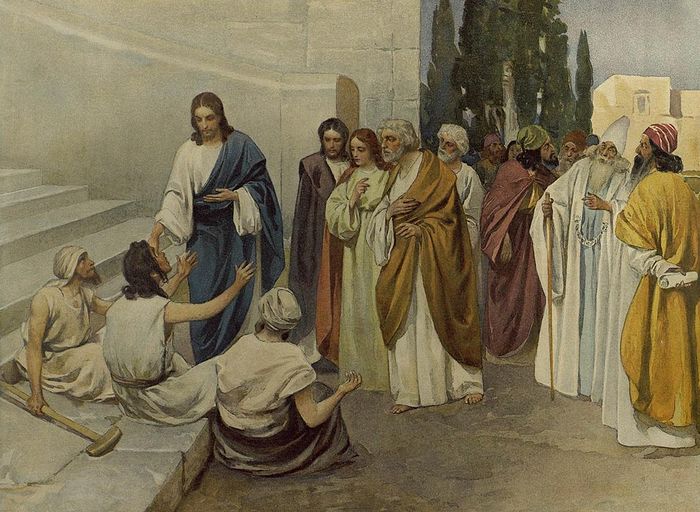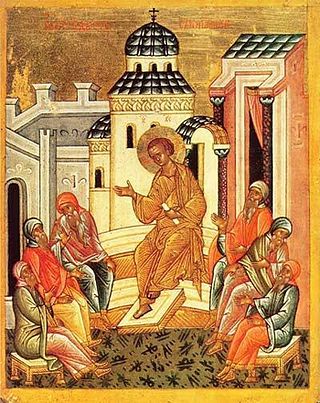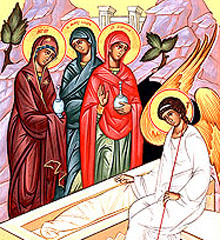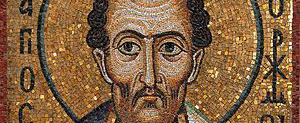Blind From Birth and Blind Souls
 For a long time I could not understand the parable of the man born blind. I did not understand Jesus’s explanation. And that is not surprising—after all, what an enormous difference there is between us and Jesus! We strive to pass by the Lazaruses of this world as quickly as possible, we don’t have the strength to bear their sufferings, and we are powerless before them. We have no money, no strength, nor either the heart—we have nothing before the face of these sufferings. And thus, running away from the Lazaruses, we are running away from our own insignificance.
For a long time I could not understand the parable of the man born blind. I did not understand Jesus’s explanation. And that is not surprising—after all, what an enormous difference there is between us and Jesus! We strive to pass by the Lazaruses of this world as quickly as possible, we don’t have the strength to bear their sufferings, and we are powerless before them. We have no money, no strength, nor either the heart—we have nothing before the face of these sufferings. And thus, running away from the Lazaruses, we are running away from our own insignificance.
Martyr Sabbas Stratelates “the General” of Rome
 Saint Sabbas Stratelates came from a Gothic tribe. For his bravery he attained the high rank of military commander or “stratelates,” and he served under the Roman emperor Aurelian (270-275).
Saint Sabbas Stratelates came from a Gothic tribe. For his bravery he attained the high rank of military commander or “stratelates,” and he served under the Roman emperor Aurelian (270-275).
From his youth, Sabbas was a Christian and he fervently followed the commands of Christ. He helped the needy, and visited Christians in prison. Because of his pure and virtuous life the saint received from the Lord the gift of wonderworking, healing the sick and casting out demons in the name of Christ.
The Feast of Mid-Pentecost and the Pentecostarion
 The fifty days following Pascha until the Feast of Pentecost are known as the period of the Pentecostarion in the Orthodox Church. At the mid-point between these great feasts of Pascha and Pentecost, on the twenty-fifth day which is always a Wedneday, is one of the most beloved feasts for the most devout Orthodox Christians known quit simply as Mid-Pentecost. Mid-Pentecost is to the Pentecostarion what the Third Sunday of Great Lent which honors the Holy Cross is to the period of Great Lent. It is a day which helps us focus on the central theme of the entire period. Whereas the mid-point of Great Lent reminds us to bear up the Cross of Christ bravely so that we may daily die with Christ in order to experience the Resurrection of our Lord, so also the mid-point of the Pentecostarion enlightens us regarding the theme of the fifty days following Pascha - which is the acquisition of the Holy Spirit poured out as a gift upon all the faithful who partake of the living water which is Christ Himself.
The fifty days following Pascha until the Feast of Pentecost are known as the period of the Pentecostarion in the Orthodox Church. At the mid-point between these great feasts of Pascha and Pentecost, on the twenty-fifth day which is always a Wedneday, is one of the most beloved feasts for the most devout Orthodox Christians known quit simply as Mid-Pentecost. Mid-Pentecost is to the Pentecostarion what the Third Sunday of Great Lent which honors the Holy Cross is to the period of Great Lent. It is a day which helps us focus on the central theme of the entire period. Whereas the mid-point of Great Lent reminds us to bear up the Cross of Christ bravely so that we may daily die with Christ in order to experience the Resurrection of our Lord, so also the mid-point of the Pentecostarion enlightens us regarding the theme of the fifty days following Pascha - which is the acquisition of the Holy Spirit poured out as a gift upon all the faithful who partake of the living water which is Christ Himself.
Sunday of the Holy Myrrhbearing Women with the Noble Joseph
 Today we commemorate the Holy Myrrh-bearing women Saints Mary Magdalene (July 22), Mary the wife of Clopas, Joanna (June 27), Salome, mother of the sons of Zebedee (August 3), Martha and Mary, sisters of Lazarus (June 4). Also Saint Joseph of Arimathea (July 31), and Nicodemus. The holy right-believing Queen Tamara of Georgia is commemorated twice during the year: on May 1, the day of her repose, and also on the Sunday of the Myrrh-Bearing Women.
Today we commemorate the Holy Myrrh-bearing women Saints Mary Magdalene (July 22), Mary the wife of Clopas, Joanna (June 27), Salome, mother of the sons of Zebedee (August 3), Martha and Mary, sisters of Lazarus (June 4). Also Saint Joseph of Arimathea (July 31), and Nicodemus. The holy right-believing Queen Tamara of Georgia is commemorated twice during the year: on May 1, the day of her repose, and also on the Sunday of the Myrrh-Bearing Women.
Synaxis of all Saints of Thessalonica. Saint Seraphim Bishop of Phanar (December 4, 1610), New Martyr Elias Ardunis (January 31, 1686), New Martyr Demetrius of the Peolponnesos (April 13, 1803)
Source: oca.org
Paschal Homily of St. John Chrysostom
 The Paschal sermon of St John Chrysostom is read aloud in every Orthodox parish on the morning of the Great and Holy Pascha of our Lord and Saviour, Jesus Christ. According to the Tradition of the Church, no one sits during the reading of St John's sermon, but all stand and listen with attentiveness.
The Paschal sermon of St John Chrysostom is read aloud in every Orthodox parish on the morning of the Great and Holy Pascha of our Lord and Saviour, Jesus Christ. According to the Tradition of the Church, no one sits during the reading of St John's sermon, but all stand and listen with attentiveness.
If any man be devout and loveth God, let him enjoy this fair and radiant triumphal feast! If any man be a wise servant, let him rejoicing enter into the joy of his Lord.






